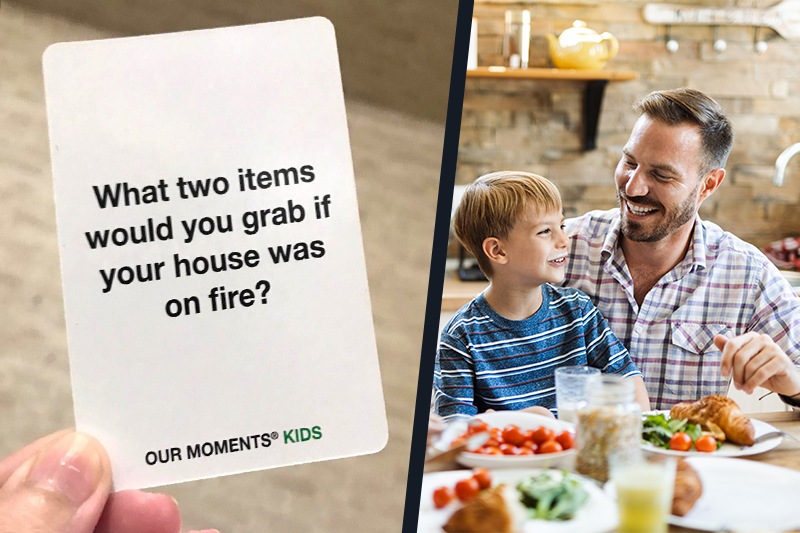The Family Unit
Strengthening Family Connections at Mealtimes
 As a new year unfolds, it can be a time to refocus on what matters most: our families. The kitchen table is often an opportunity for parents to connect with their children, whether they are toddlers, preschoolers, or teenagers. The early you start breaking bread with your children, the more likely you will have them eating dinner with you when they are teenagers. Bonus, you will know where they are and what they are eating.
As a new year unfolds, it can be a time to refocus on what matters most: our families. The kitchen table is often an opportunity for parents to connect with their children, whether they are toddlers, preschoolers, or teenagers. The early you start breaking bread with your children, the more likely you will have them eating dinner with you when they are teenagers. Bonus, you will know where they are and what they are eating.

Keep Connected
Leigh Wood Landry, military spouse, and Special Needs Inclusion and Parent Support Specialist Worker at the Kingston Military Family Resource Centre, stresses the importance of families connecting at mealtimes.
“Connecting with family at mealtimes helps children and youth develop healthy eating habits, enhance their vocabulary, and build mental health and resilience. Sharing a meal is a relatively easy tradition that provides a safe base for growing children,” notes Landry.
Research suggests that families that break bread together feel a stronger bond with one another. In today’s world, it is easy for everyone to feel disconnected due to work and school, especially in a military family, when one member of the family is away due to deployment, course, or training. Eating together allows families to reconnect. It also allows parents the opportunity to keep up with what is going on in their children’s lives. Not only can parents find out what is going on in their children’s lives, but mealtimes also offer families the opportunity to catch up on each other’s day.
It is also an excellent time:
- Children can discuss the challenges they may be facing at school
- To confirm upcoming events
- Confirm their homework completed
- Plan family activities
- Plan upcoming vacations
- Review house rules.

Set Boundaries
Landry suggests, “A few parameters help show that everyone’s voice is welcomed and valued. It’s especially helpful to put these into practice after the hectic pace of the holidays to regain consistency and routine.”
Some rules families might include:
- Turn off distractions, including phone notifications and the television, for a given period of time.
- Support each other, whether family members are talking about happy experiences or problems.
- Be patient, and take turns contributing to the conversation. Welcome non-verbal communication from children just learning to speak, and/or people with special needs.
- Build active listening and empathy: more connecting, and less correcting when others talk.
According to the familydinnerproject.org, research suggests families that take time to eat dinner together have numerous benefits for children. A few include:
- Perform better academically.
- Have higher self-esteem.
- Have a greater sense of resilience.
- Lower risk of substance abuse.
- Lower risk of depression.
Make it Fun
If you are looking to add some fun to dinnertime by marking memorable moments that took place during the day, why not try giving your child a “high five of the day” to recognize accomplishments or improvements of any size. You can also add a gratitude jar or name everyone’s top three moments during the week at your Friday night dinner.

Ideas for Deployed Families
“A lot of insightful and important discussions end up happening before and after meals, too,” adds Landry. Before or after a meal is an excellent opportunity for a family to do a countdown ritual. Countdown rituals are one way to mark the days until a parent’s deployment ends. One way is to mark a calendar, or another way is to eat one candy from a jar each day. When the sweets are gone, the parent will return. Families can also create and check off items from a deployment or vacation/stay-cation bucket list.

Get the Conversation Started
Landry suggests families can make dinnertime an occasion the whole family can look forward to by taking turns to choose a discussion topic. Conversation starters are an excellent way to get your children (including teens) talking. A few examples include using a hat with topics in it to discuss or to purchase a set of conversation starter cards, like Our Moments Kids edition, which can be purchased for $24.95 amazon.ca. Discussion starters can also be found in various books and online.
Another way to connect at dinner time is to embrace Taco Tuesday, Friday night pizza and movie night or Saturday appetizers, and Board Game Night. “Families can encourage children to be involved in age-appropriate ways throughout the process – for instance, deciding on a meal or sides, rinsing or chopping vegetables, putting out plates, choosing background music, and helping with clean-up,” suggests Landry.
She adds, “Recognizing and using their abilities and skills will build children’s self-confidence, fine motor skills, and social interaction; while demonstrating that strong families spend time together when they can and make a habit of helping one another.”

Break down barriers
With busy schedules, sometimes it can be a challenge for a family to break bread together as they may be heading out in different directions in the evening due to activities, meetings, or work. To ensure your family connects at mealtime Landry suggests:
- Commit to eating a healthy snack together before or after returning from extra-curricular activities.
- Start with one or several days a week if every night is not possible.
- Consider breakfast as the mealtime for your family.
- Develop different routines when only several family members are together. For example, if mom works Thursday evenings, maybe that is the night for special pizza nights with dad.
Not only will eating meals together strengthen your family, but it can also build your savings. According to one study, a family of four could save nearly $40 per person per week by making and eating dinner at home. That is almost $700 a month and over $8,300 a year.










